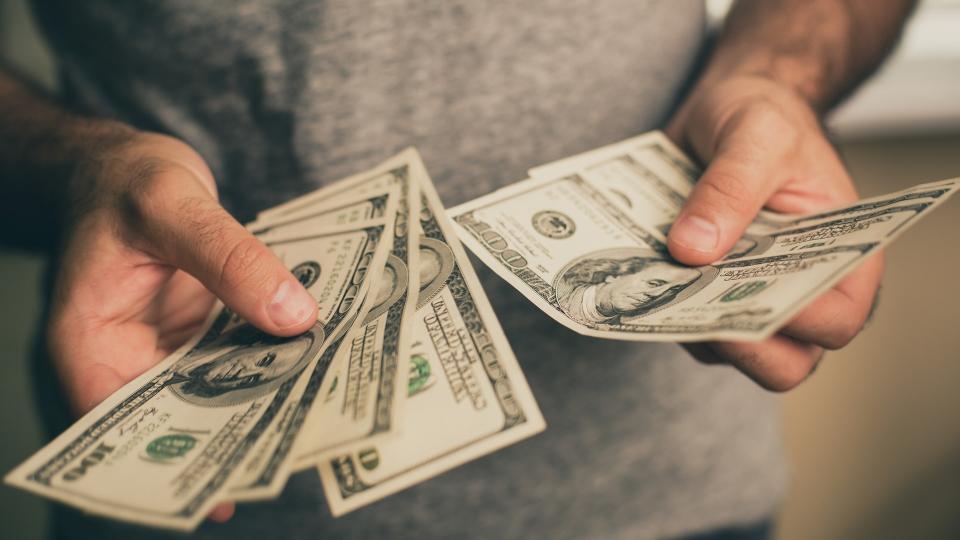7 Things You Must Do When You Have Extra Cash Flow

If you find yourself with extra cash flow — whether at the end of every month or thanks to a sudden windfall — consider yourself lucky. Indeed, 65% of Americans say they frequently live paycheck to paycheck, according to Barron’s. In addition, 30% of households said they run out of money at the end of every month, while 35% say they don’t have money left at the end of most months, the report added.
Read: Suze Orman: Young People Could Retire Millionaires by Doing This One Thing
Learn: 3 Things You Must Do When Your Savings Reach $50,000
But if you’re one of the lucky few with extra cash flow, there are still some steps you can take to make the most of it or make it grow — and some mistakes you should avoid.
Evaluating and setting your financial goals can help establish smart budgeting habits, said Alia Dudum, money expert at LendingClub.
“That way, when you have extra cash flow, you can easily prioritize these benchmarks and focus on healthy financial decisions, such as increasing your emergency fund and eliminating debt,” added Dudum.
Sponsored: Owe the IRS $10K or more? Schedule a FREE consultation to see if you qualify for tax relief.
Avoid Lifestyle Creep
It can be very tempting to get carried away by extra cash, but experts warn that it’s essential to avoid lifestyle creep as much as possible.
“It’s smart financial planning to prioritize paying down debt, accelerating retirement savings and building a larger emergency fund, but it’s equally important not to let new, especially temporary, extra cash increase your expenses,” said Zach Robbins, founder of Loanfolk.
According to Robbins, it’s very common for people to spend more when they earn more, and if you’re not vigilant, the extra cash may hurt more than it helps in the longer term.
Next: I’m a Bank Teller: Here Are 10 Mistakes You Are Making With Your Banking
Pay Down Debt
Pay down your credit card debt — and other high-interest debts — if you have any.
“Given the average credit card interest rate today — nearing 23% for accounts with balances that assess interest — paying it off effectively gives you that amount of return,” said Sean Fox, president of debt resolution at Achieve.
And as Taylor Kovar, CFP, CEO and founder of Kovar Wealth Management, added, this not only saves you money on interest but also improves your credit score and reduces financial stress.
Take Care of Your Emergency Fund
Another important step to take with extra cash is to build up your emergency fund — which experts recommend should be worth three to six months of living expenses.
According to Bobbi Rebell, CFP, founder of Financial Wellness Strategies and author of “Launching Financial Grownups: Live Your Richest Life by Helping Your (Almost) Adult Kids Become Everyday Money Smart,” the most important thing is to make sure your emergency fund is fully funded.
“Then consider adding another 10%, just for good measure,” she added.
Boost Retirement Contributions
If you aren’t contributing to your company’s 401(k) plan, use your extra cash to start putting it away for retirement.
Invest at least up to the amount your company offers to match your contributions, but more if you have the extra cash flow and have already built your emergency fund and paid off debt, said Andrea Woroch, consumer and money saving expert.
Consider Tax-Advantaged Ways To Save
For instance, Chris Urban, founder at Discovery Wealth Planning, said that you should assess whether you are contributing the annual maximum to accounts like your 401(k), 403(b), 457, Traditional IRA, Roth IRA, Health Savings Account (HSA) or 529 Plan.
“All of these plans — or accounts — offer some form of tax benefit, subject to certain limitations,” he said.
Fox echoed the sentiment, saying that many people have health insurance through their employers that use a flexible spending account (FSA), but others — especially those who purchase their own insurance — may have a high-deductible policy that is eligible for an HSA.
“Contributions are tax-deductible, and when you pay for a qualifying medical expense with your HSA funds, it is tax-free,” he added.
Invest in Passive Income Streams
This is a step you can consider once your emergency fund and retirement savings are on track, said Kovar.
“This could include dividend stocks, index funds or real estate investment trusts (REITs),” he said, adding that these investments can grow your wealth over time with minimal ongoing effort.
Another way you can start investing to create passive income, according to Woroch, is by looking for an undervalued property in a popular area that you can flip into a short term rental to create a cash-flowing asset in which renters pay the mortgage and build equity in the property.
Invest in Yourself
For Andy Cooper, financial analyst and money saving expert at CouponBirds, that can translate into enhancing your education.
“With extra cash, it will be more convenient for you to be a lifelong learner and carry on with your further education, like enrolling in continuing education programs to learn some skills based on your needs and interests,” he said.
For instance, he suggested that you can try to obtain certificates in the financial management area to better look after your finances.
Woroch agreed with this premise, saying that you should put money back into yourself to boost your money making potential.
“Look for networking conferences, workshops where you can learn new skills and also invest in your health for better quality of life,” she said.
More From GOBankingRates
I'm a Bank Teller: Here Are 10 Mistakes You Are Making With Your Banking
Use This Checklist To See Whether Your Bank is Costing You a Lot of Money
One Strategy Everyone With a Credit Card Balance Should Consider
This article originally appeared on GOBankingRates.com: 7 Things You Must Do When You Have Extra Cash Flow

 Yahoo Finance
Yahoo Finance 